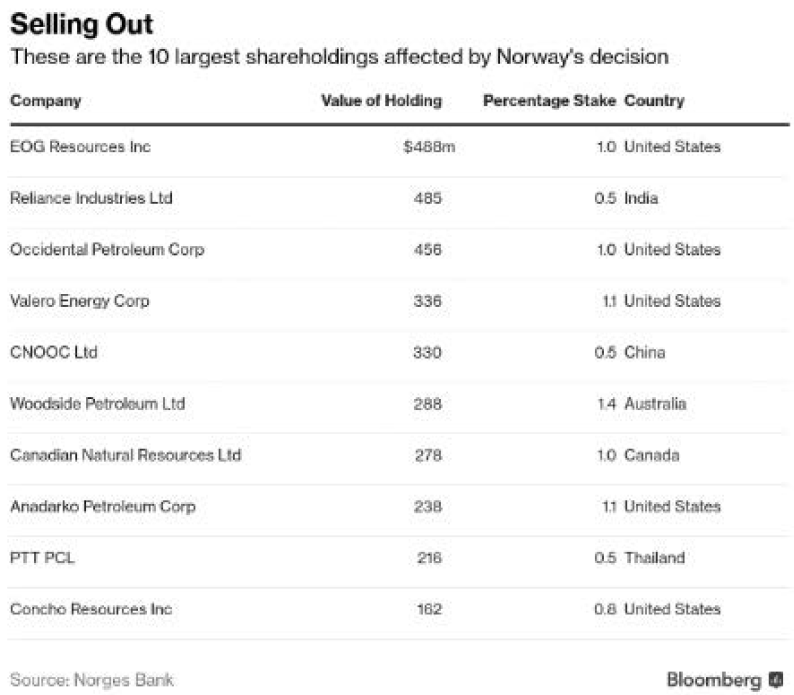
The decision by the world’s biggest sovereign wealth fund to sell some of its energy holdings encompasses a vast array of companies, from US shale drillers and developers of Canadian oil sands, to off shore drillers from Africa to China. Norway’s $1tn investment fund said on Friday that it will gradually sell its holdings in oil and gas exploration and production companies in order to reduce the country’s exposure to a permanent decline in crude prices. That’s a smaller step than the full fossil-fuel divestment that some were proposing, but still aff ects some of the industry’s most famous names. Houston-based shale driller EOG Resources Inc is the biggest shareholding to be sold, with a total value $488mn, or just under 1% of the company, according to the fund’s website. Indian petroleum and chemicals giant Reliance Industries Ltd is the next largest, with a stake of 0.5% worth $485mn. Other notable US names include Anadarko Petroleum Corp, Apache Corp and Occidental Petroleum Corp On the other side of the Atlantic, explorers Tullow Oil Plc and Premier Oil Plc are aff ected. All of them appear on a list of 134 companies placed in the exploration and production category FTSE Russell. The stocks will be “phased out from the fund gradually over time,” according to Norway’s finance ministry, which may prevent the sale causing any big changes in these companies’ market values. But the move also raises questions about the industry’s appeal to investors in the very long term. “The Norwegian sovereign wealth fund is seen as something of a poster-child amongst sovereign wealth funds,” said Alejandro DeMichelis, director of oil and gas research at Hannam & Partners LLP. “This decision could also trigger other large investors to review their stance toward investing in the oil and gas sector.” Life is changing for oil companies. Ten years ago, they accounted for about 15% of the S&P 500 index. Today, they make up just 5%, having been mostly displaced by technology giants such as Facebook Inc and Apple Inc. Driving this shift is a smorgasbord of new energy sources that’s bringing unprecedented competition for capital. Consumer choices are set to drift farther from the hydrocarbons of the 20th century, with renewables potentially meeting about a quarter of demand by 2040, according to oil major BP Plc. It’s no surprise, then, that investors are increasingly questioning the wisdom of betting on oil. A divestment campaign started by activist group 350.org in 2012 has already persuaded funds holding $8tn to back away from fossil fuels, according to its website. Scrutiny could intensify as AGM season approaches. Catherine Howarth, chief executive off icer of ShareAction – a group that has targeted Royal Dutch Shell Plc in the past – said she expects a “ramp-up” of pressure at annual general meetings that start in the spring.



